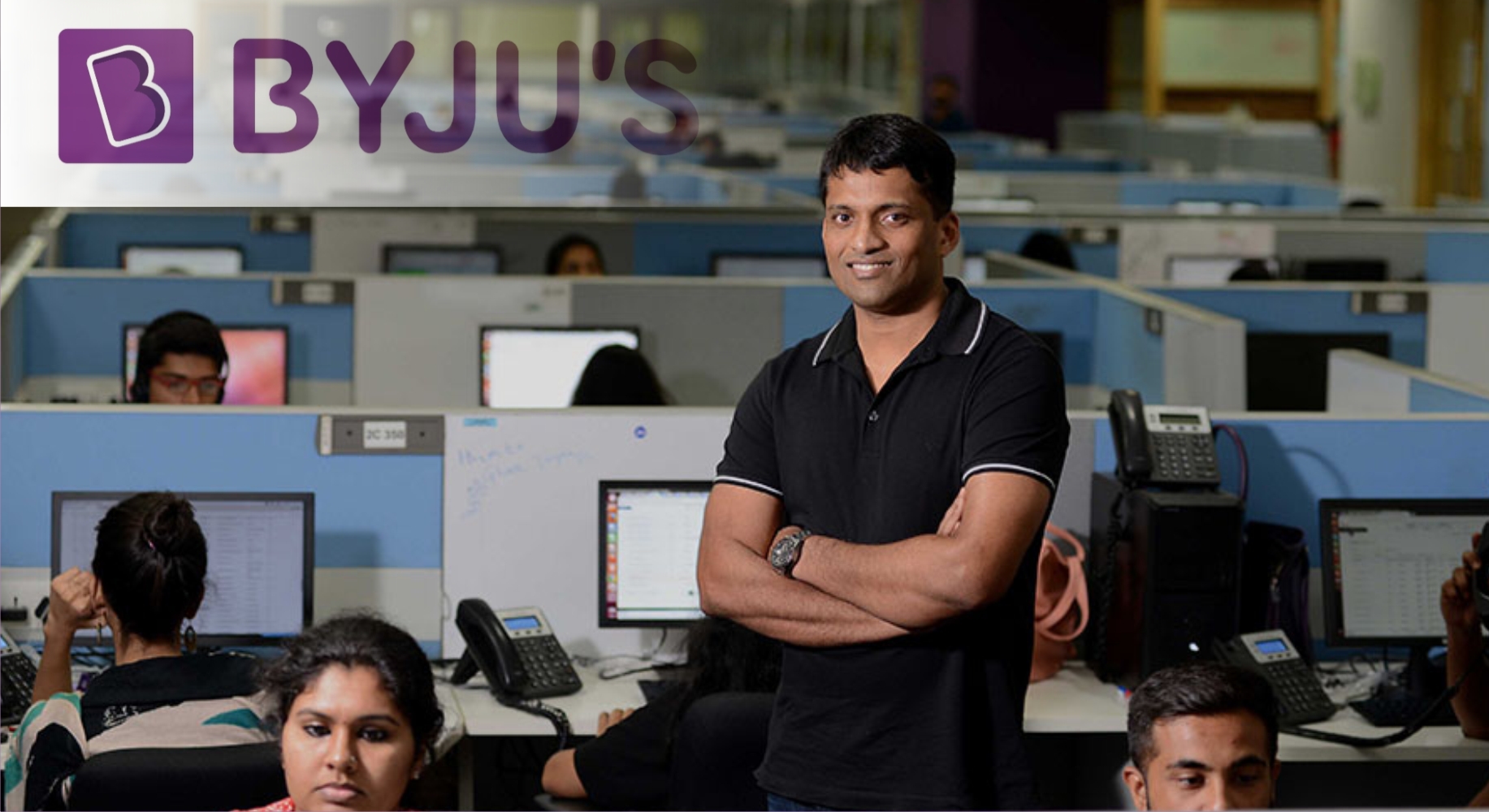BYJU’S, an ed-tech company, was founded in 2011 by Byju Raveendran and Divya Gokulnath. Headquarters in Bengaluru, India. BYJUs aims to revolutionize learning via technology, interactive content, and personalized methodologies. In 2015, BYJUs launched its flagship product, BYJU’s: The Learning App, in India. This app employs animated videos, games, and quizzes to create an engaging, adaptive, and personalized learning experience. BYJUs offers tailored learning programs for students from grades 1 to 12 and for IIT-JEE, NEET, CAT, GRE, and GMAT as well. By April 2023, the company reported having over 150 million registered students.
Byju Raveendran expressed deep emotional distress in a letter to Byju’s employees, stating, “I saw my father breaking down” and “it made me feel a sudden pain.” Once celebrated as India’s leading ed-tech giant and the nation’s most valued startup, Byju’s is currently grappling with significant challenges. These include a severe liquidity crisis, accounting discrepancies, regulatory scrutiny, allegations of misselling courses, aggressive marketing practices, overpricing issues, and extensive layoffs, among other issues.
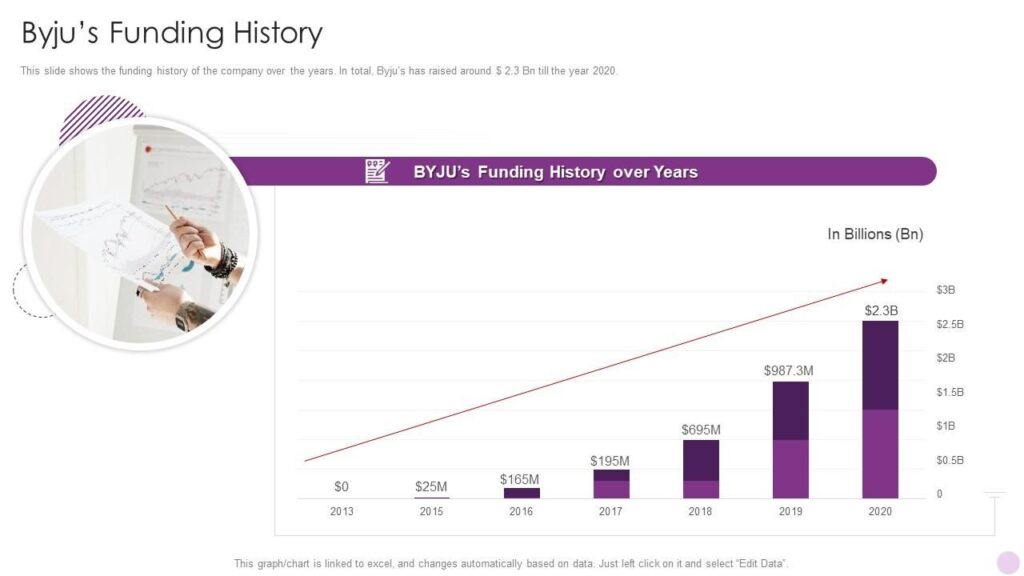
During the phenomenal rise of BYJU’s during the COVID-19 pandemic, troubling media reports began to emerge in India, alleging that the company employed exploitative, immoral, and illegal practices to pressure children to buy the course. Reports indicated that parents were subjected to relentless cold calls and visits from sales representatives, who insisted that not subscribing to BYJU’S courses would doom their children to a life of poverty. The company allegedly urged parents, regardless of their financial status or their children’s actual need for the courses, to make purchases and even facilitated loans from banks to finance these courses.
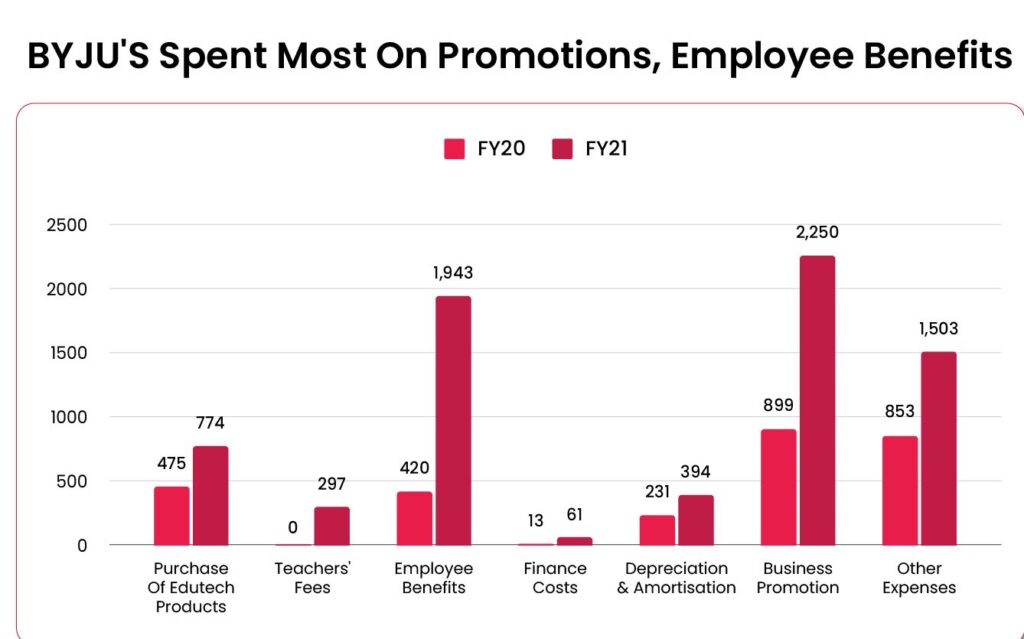
BYJU’S also garnered significant attention with its strategic use of celebrity endorsements, enlisting stars like Shah Rukh Khan and Priyanka Chopra to promote its brand. These high-profile endorsements initially boosted BYJU’S reputation and expanded its reach, enhancing its credibility among the public. However, this approach also attracted increased scrutiny and raised expectations. Critics questioned the authenticity of the endorsements and their true impact on educational outcomes, emphasizing the potential pitfalls of relying heavily on celebrity influence in the education sector. While the endorsements provided visibility, they also brought risks and challenges to BYJU’S image and efficacy.
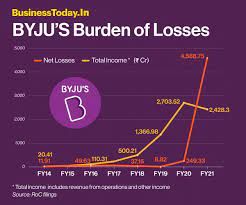
The Downfall starting 2023…..
As the COVID-19 pandemic subsided, the demand for online education in India began to decline. By April 2023, BYJU’S faced mounting legal troubles when the Enforcement Directorate (ED), India’s premier financial intelligence agency, raided three of the company’s offices for allegedly violating the provisions of the Foreign Exchange Management Act (FEMA).
With increasing pressure from lenders, BYJU’S is now seeking to raise $200 million from investors, based on a valuation of $250 million. This represents a staggering 99 percent reduction from the company’s peak valuation of $22 billion.
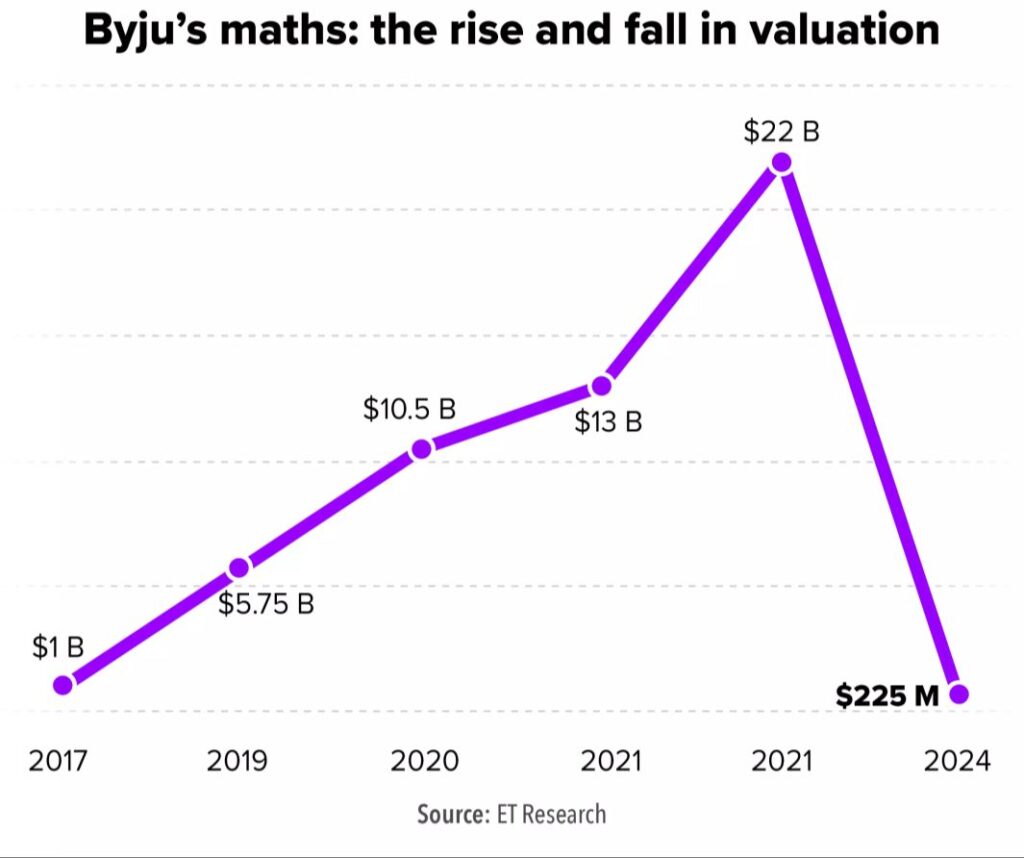
A closer examination reveals several critical mistakes that contributed to the company’s decline:
1) Financial Management: Byju’s wanted to grow really fast, but they spent all their money too quickly. This left them with not enough cash to keep going and made investors nervous. Because of this, Byju’s had trouble dealing with new problems and wasn’t prepared for things to change in the market. They also tried to do too much at once, which made it hard for them to succeed.
2) Lack of leadership: The leader of Byju’s, Byju Raveendran, wasn’t able to keep everyone working together smoothly. This caused arguments and disagreements within the company, and employees weren’t happy or motivated. Because of this, Byju’s wasn’t able to work as efficiently as they could have
In summary, BYJU’S downfall can be attributed to financial mismanagement and leadership failures, which collectively undermined the company’s stability and growth potential. These mistakes not only weakened the company’s financial position but also led to a fractured internal environment, ultimately stalling its progress and contributing to its dramatic decline..
The Impact of BYJU’S Current Situation and Strategic Adjustments
Background and Recent Developments
BYJU’S, once celebrated as a leading edtech company in India, is now grappling with severe financial and operational challenges. Amidst a liquidity crisis, BYJU’S has implemented drastic cost-cutting measures, including relinquishing all its offices across India except its headquarters at IBC, Knowledge Park in Bengaluru. This move is part of a broader restructuring strategy spearheaded by BYJU’S India CEO Arjun Mohan, aimed at stabilizing the company’s finances and operations.
Office Closures and Work-From-Home Mandate
In response to its financial strain, BYJU’S has mandated that all employees work from home indefinitely, except for those based at the headquarters and approximately 300 BYJU’S Tuition Centres nationwide. This decision is not only a cost-saving measure but also a strategic shift to streamline operations and reduce overhead costs associated with maintaining multiple office spaces.
Investor Disputes and Funding Challenges
Compounding the company’s troubles is a dispute with investors over the legitimacy of funds raised from a recently concluded rights issue offering. This dispute has further strained the company’s liquidity, delaying the disbursement of salaries for about 75 percent of its employees in India, totaling approximately 14,000 individuals.
Key Takeaways and Strategic Lessons
1. Align Growth with Core Values:BYJU’S rapid expansion, while impressive, appears to have outpaced its financial capabilities and may have deviated from its core values and mission. Ensuring that growth aligns with core values is essential for maintaining integrity and trust among stakeholders
2. Transparency and Ethical Practices:The ongoing dispute with investors and the delayed salary payments highlight the importance of transparency and ethical practices in business operations. Building and maintaining trust with investors, employees, and customers requires clear, honest communication and ethical behavior.
3. Focus on Quality Education: As an edtech company, BYJU’S primary focus should remain on delivering high-quality educational content and experiences. Prioritizing the quality of education ensures that the company stays relevant and competitive in the market
4. Adaptability:The current challenges faced by BYJU’S underscore the need for agility and adaptability in a rapidly changing market. Companies must be prepared to adjust their strategies and operations in response to emerging challenges and opportunities.
Conclusion
Byju’s spent too much money too fast and the leader couldn’t keep everyone happy. This made them weak and unable to keep growing. To recover, Byju’s needs to focus on what they do best, be honest, and adapt to changes in the education market. If they can do this, they might be able to bounce back and become a leader in educational technology again.







